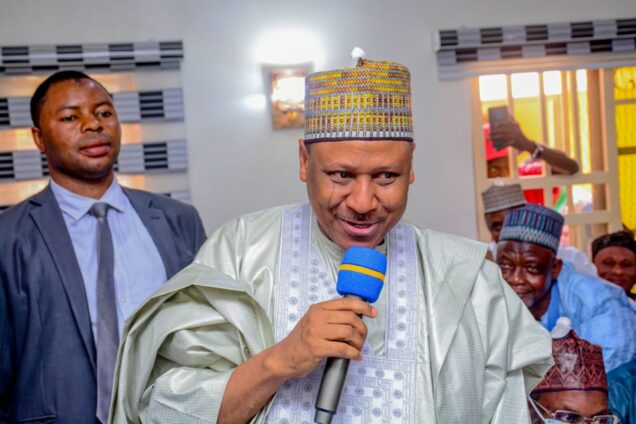The Minister of Information and National Orientation, Mohammed Idris Malagi has restated the Feseral government’s planned wage increment of N35,000 monthly for Nigerians workers to cushion the impact of the fuel subsidy removal.
The Minister reiterated this during the end of year world press conference held Thursday in Abuja, where he presented an overview of the achievements of the Tinubu Administration across key sectors, since assumption of office on May 29, 2023.
He noted that the Renewed Hope Agenda is the central governing agenda of the President Bola Ahmed Tinubu Administration, anchored on Eight (8) Priority Objectives that will help build a more just and equitable Nigeria, as follows: (1)Reform the economy to deliver sustained inclusive growth, (2) Strengthen national security for peace and prosperity, (3)Boost agriculture to achieve food security, (4) Unlock energy and natural resources for sustainable development, and (5) Enhance infrastructure and transportation as enablers of growth.
Others included: (8) Improve governance for effective service delivery, Focus on education, health, and social investment as essential pillars of developmen, and (7) Accelerate diversification through industrialization, digitization, creative arts, manufacturing & innovation.
The Minister stressed that the 2023 Supplementary Budget of 2.176 Trillion, and the 2024 budget of N27.5 Trillion—the Administration’s first Full-Year Budget—presented to the National Assembly by the President, both echoed the core tenets of the Renewed Hope Agenda, and serve as pivotal steps towards realizing the ambitious and transformative objectives of the Agenda.
He recalled that the President made a bold and strategic move immediately after his swearing in with the removal of fuel subsidy.
According to him, the decision was born out of a commitment to fiscal responsibility and a keen eye on national progress, is a testament to “our administration’s dedication to effective resource allocation and blocking avenues of wastage”.
He said,”The removal of the fuel subsidy is a decisive step towards channeling resources where they matter most – impacting sectors critical to our national development. By redirecting these funds, President Tinubu aims to bolster key areas such as healthcare, education, infrastructure, humanitarian, security and other sectors that directly influence the well-being and prosperity of our citizens.
“This move is not without its challenges, but it signifies our unwavering commitment to making difficult decisions in the interest of the greater good. It aligns with our vision for a Nigeria that thrives on efficiency, transparency, and responsible governance. Fuel subsidy removal is a crucial step towards a more sustainable economic future, and we are working tirelessly to ensure that the benefits of this decision are felt by all citizens.
“Like I said, the removal of fuel subsidy is also accompanied with some initial challenges but President Tinubu and the Administration have been taking all necessary measures to alleviate the pains being felt, and to cushion the impact of these reforms. These interventions are designed to serve as palliatives in the short and medium-term, while we wait to reap the long-term benefits of the reforms, as follows:
“A provisional wage increment of N35,000 monthly for six months, to enhance federal minimum wage, without causing undue inflation.”
The Minister further revealed that the federal government has made effort in establishing Infrastructure Support Fund for States to invest in critical areas that will create an enabling environment for businesses.
“There is the Establishment of an Infrastructure Support Fund for States to invest in critical areas that will create an enabling environment for businesses
“Launch of a 100 Billion Naira CNG bus rollout programme, to deliver CNG-powered buses, and establishment of a Presidential Committee to drive implementation.
“We are finalizing the process for payment of a Cash Transfer of N25,000 monthly to 15 million of the poorest and most vulnerable households in Nigeria, for three months.
“A presidential directive for the release of 200,000 Metric Tonnes of grains from strategic reserves to households across the 36 states and FCT to moderate prices, and 225,000 metric tonnes of fertilizer, seedlings and other inputs to farmers,” he said.
The Minister added,”An access-to-credit programme for startups and MSMEs: providing N50 billion in Conditional Grants to 1 million nano-businesses across Nigeria between now and March 2024; and a new single-digit interest-rate Fund to provide N75 billion to support manufacturing enterprises; among others.
“We have launched the 3MTT programme that aims to develop 3 million technical talents by 2025, in line with the President’s vision for making Nigeria a global hub for digital jobs.
“Still in line with the jobs agenda, we launched the National Talent Export Programme (NATEP), to create one million service-export jobs over the next 5 years, and make Nigeria a global business outsourcing hub.”
He said the federal government has launched the National Philanthropy Office (NPO), which he said is established to mobilize $200 million in private investments on behalf of the Federal Government, to support MSMEs in Nigeria.
He also revealed that government has equally launched the Small and Medium Enterprises Development Agency of Nigeria (SMEDAN) partnership with Sterling Bank establishing a 5 Billion Naira single-digit-interest Fund, among others.
He further revealed,”By January 2024, we will be rolling out the new Federal student loan program that was announced a few months ago.
“Presidential Approval for ASUU to exit IPPIS, which will advance University autonomy and also bring greater operational stability to the Federal University system.
“The Federal Government is also working on a new minimum wage for workers, which will come into effect next year.”





